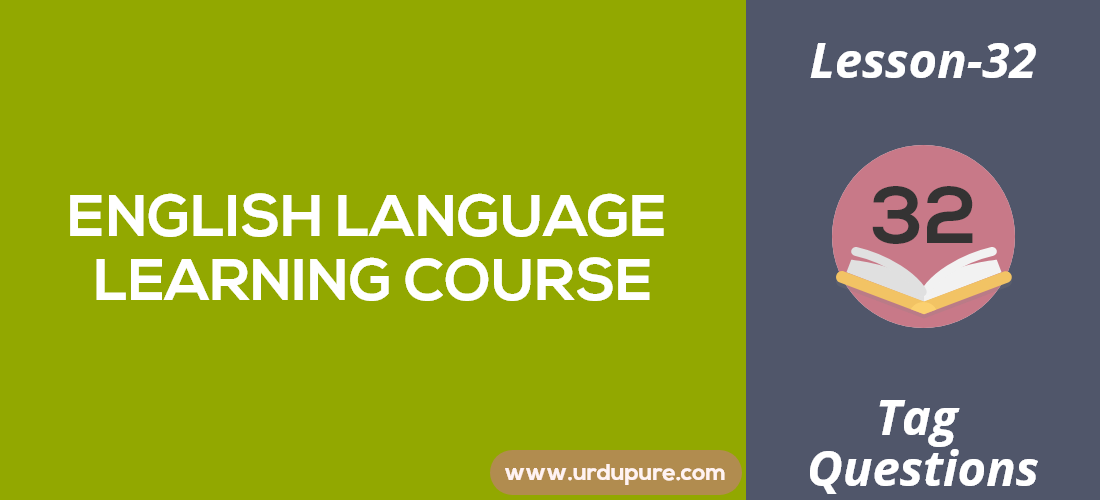Tag Questions

Tag Questions
We consider all of the statements as questions, that ends in a question mark. Right? But few of us know that questions are further categorized into four types.
- Yes / No questions.
- WH- questions
- Choice questions
- Tag questions
In this lesson, you are going to learn tag questions. You will learn the formation of tag questions, their nitty-gritty and rules of composition of tag questions.
A tag question is a mini question that is used to ask for information or agreement of something. It is attached at the end of the sentence. Modal or auxiliary verbs or ‘be’ form of a verb are used in tag questions.
Example:
- It is hot today. Isn't it?
- I am looking stylish today. Aren't I?
- They can pick you from my place. Can't they?
- You don't like him. Do you?
In the above-given examples, isn't it? Aren't I? do you? and can't they? Are considered as a mini or tag questions. All of these questions ask about some conformation or agreement of one thing or the other.
Types of tag questions.
You can see in the above questions that some tags are negative, and some are positive. Don't you? There are two types of tag questions.
- Positive tags: In Positive tag questions, negative sentences are followed by positive tags. You cannot construct a negative sentence with a negative tag question.
- Negative tags: In Negative tag questions, positive statements are followed by negative tags. This means that the main clause is affirmative, and the question tag is negative.
There is a little difference between the formation of positive tags and negative tags. Let's see.
Formation of positive statements with negative tags:
Positive statements | Negative tags | |||||
Subject | Auxiliary | Main verb | Object(optional) | Auxiliary | Not | Personal pronoun |
You | Are | Going | Home. | Are | n’t | You? |
She | Is | Looking | Pretty | Is | N’t | She? |
Aleena | Was | Cooking | Fish | Was | N’t | She? |
He | Will | Help | me | Will | Not | He? |
Formation of negative statements with positive tags:
Negative statements | Positive tags | |||||
Subject | Auxiliary | Not / | Main verb | Object( optional) | Auxiliary | Personal pronoun |
You | Are | Not | Going | Home. | Are | You? |
She | Is | Not | Looking | Pretty. | Are | You? |
Aleena | Was | Not | cooking | Fish. | was | She? |
He | Will | Not | Help | me | Will | He? |
Your | Neighbors | Never | Share | anything | Do | They? |
Now you can see that there is a difference in structure between negative tags and positive tags. But this was a general formation of tag questions showing negative tags are followed by affirmative sentences and positive tags are followed by negative statements. But there are different rules to form tag questions.
Rules:
There are rules to form tag questions depending on the auxiliary verbs, subjects, and much more.
Most of them are discussed below.
1. If the subject of an affirmative statement in the present tense is 'I' auxiliary verb 'aren't I' is used in the tags.
- I am sitting on the right broken bench, Aren't I? (correct)
- I am sitting on the broken bench, Ain't I? (incorrect)
2. With "let's," the tag is shall.
- Let's have some ice cream. Shall we?
- Let's go to Switzerland next week. Shall we?
3. You have to use a positive tag, if the sentence contains a negative verb such as, hardly, never.
- He will never be mine. Will he?
- He hardly pays his fee. Does he?
4. You have to use 'it' in tag questions; when this, that, nothing is used in a sentence.
- Nothing went wrong in today's seminar, did it?
- That bag is yours, isn't it?
- This shoe isn't yours, is it?
5. You have to use “didn’t” in a tag if your sentence includes “used to” verb.
- She used to sleep early, didn’t she?
6. You have to use “they” in a question tag if your sentence contains indefinite pronouns such as nobody, somebody, everybody, someone, everyone, etc.
- Everyone is having lunch, aren’t they?
- Nobody has entered here, have they?
7. You have to use “will” or “would” in question tags with imperative sentences.
- Shut the door, will you?
- You will wait for me here, would you?
8. Do not use proper nouns; use personal pronouns for people.
- Chris is your best friend, isn't he?
- Bella is never absent in class, is she?
9. You have to use "don't/didn't" in the question tag if your sentence contains "have or had" as a main verb.
- You have a heavy bike, don't you?
- He had a heavy bike, didn't he?
Note: In North American English, using haven't or hadn't is considered correct in tag questions.
10. Use "wont" for polite requests.
- You will help me with my assignment, won't you?
Positive and Negative tags in present and past tense.
Tenses | Negative tags | Positive tags |
| Present simple other verbs | Paul likes bananas, doesn’t he? | Paul doesn’t like banana, does he? |
| Present simple ‘be’ | I am talkative, aren’t I? | I am not talkative, am I? |
| Present continuous | We are going to the party, aren’t we? | We are not going to the party, are we? |
| Present perfect | We have been to London, haven’t we? | We have not been to London, have we? |
| Present perfect continuous | We have been enjoying rain since morning, haven’t we? | We haven’t been enjoying rain since morning, have we? |
| Past simple other verbs | Mr. duke went to London, didn’t he? | Mr. duke didn’t go to London, did he? |
| Present simple ‘be’ | He was sad last night, wasn’t he? | He was not sad last night, was he? |
| Past continuous | We were preparing for dinner when she arrived, weren’t we? | We were not preparing for dinner when she arrived, were we? |
| Past perfect | Paul had forgotten his keys, hadn’t he? | Paul hadn’t forgotten his keys, had he? |
| Past perfect continuous | George had been working, hadn’t he? | George had not been working, had he? |
Answering tag questions
Answering tag questions is easy. You can either say yes or no in reply to the question. Sometimes you can reverse the tag question and answer it.
Example:
- You live here, don't you? Yes, I do.
Be careful about the questions that are asking about the truths or facts. Your answer should reflect reality, you don't need to agree with it all the time.
Example:
- Sun is hot, isn't it? Yes, it is.
- Sun isn't hot, is it? Yes, it is.
- Sun is cold, isn't it? No, it isn't.
- Sun isn't cold, is it? No, it isn't.
Rising and falling tone
Tag questions are used to ask about confirmation, information, or favors. If we ask about something we don’t know, we use a rising tone with the tag question. But when we want some agreement or confirmation, we use a falling tone with the tag questions.
Conclusion:
In this lesson, you learned about the tag questions. Try to remember the difference between positive and negative tags that positive tags are followed by negative statements and negative tags are accompanied by positive statements.
}



